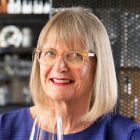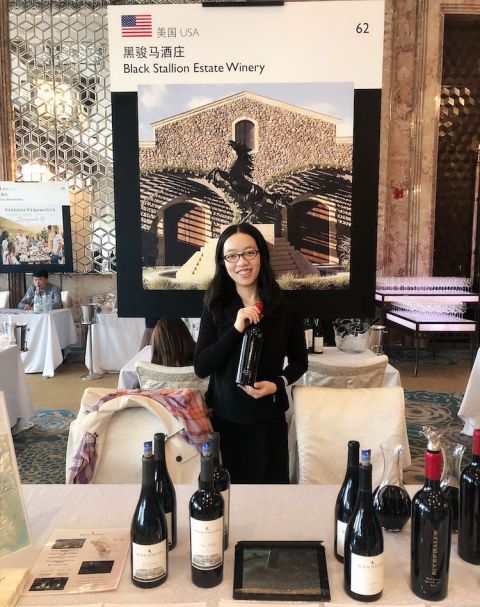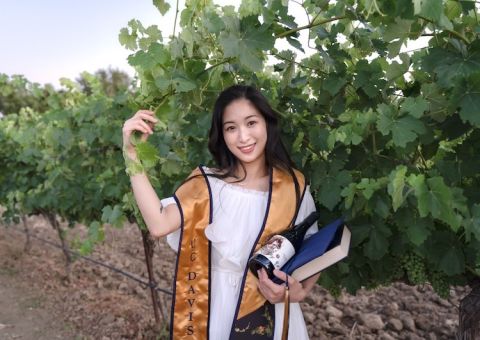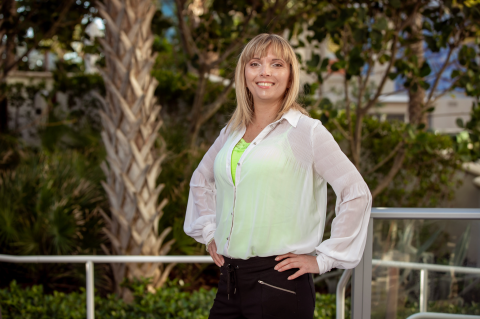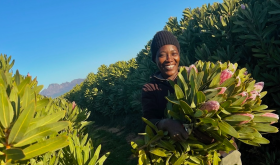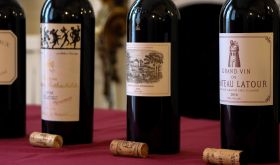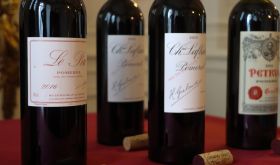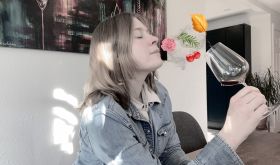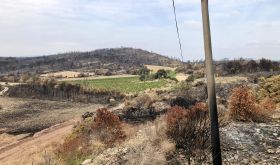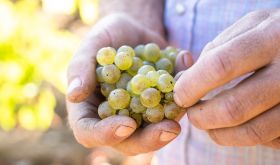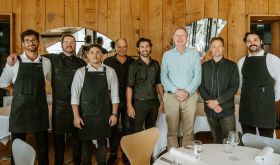Flex Aleo, pictured above and awarded a Wine Scholar Guild scholarship this year, is a Black South African wine professional living in Toronto, Canada, and the founder of Marvonnay Inc, a ‘sophistication club’ whose name was inspired by the song lyric ‘this was all inspired by a little Marvin Gaye and Chardonnay’. Flex got into wine in 2014 and, after falling in love with it, decided that it would be his ‘vessel to enter cultural enlightenment’.
Flex has a glowing reference from his tutor at George Brown College in Toronto. He gained a Merit in his WSET Level 3 exams and has completed D1 with Merit of his Diploma. He has often felt discriminated against, which has prevented him from progressing further within the industry. This was a major impetus for him to found Marvonnay, creating his own space within the sector. ‘I recently decided to stop knocking on the gates that won’t open and start knocking on those that will, even if I have to build them myself’, he wrote in his application. Flex’s eventual ambition is to craft Marvonnay into an educational platform that will present its courses ‘through an authentic BIPOC lens … where being BIPOC is celebrated for all the right reasons’.
He maintains, ‘I am beyond determined and can pass the MW courses which are demonstrated by my academic achievements (I made the Dean’s Honors List with my two undergraduate degrees). I am motivated to reach the MW status because, for Marvonnay to be the most desirable educational membership in the world, I have to be the best wine educator bar none.’ Fighting talk!
Jing Jin is a Chinese employee of Delicato in the Napa Valley currently studying to become an MW. ‘My mission is to be a functional bridge between East and West’, she says, ‘contributing to cross-culture communication and the global wine business’. She has also joined Natasha Hughes MW’s UK-based study group every Saturday at 5.30 am, which shows a certain amount of determination.
‘It is a true adventure to be an immigrant all by myself in the USA wine industry without any wine background. I am a single Chinese female working in the California wine export business as a non-native English speaker. There were many doubts and obstacles for me to overcome over the years, but I made it and found my own way to thrive in the global wine industry. I speak Chinese, English, Japanese and some basic German. I also understand Korean culture very well.’
She has deliberately decided not to remain in China as a wine educator, a common career path for Chinese women in wine, but wants to develop Asian markets for wine. As an only child and a female, she feels a particular empathy with young female wine drinkers in the emerging markets of Asia.
Junqi Peng is another Chinese woman based in California. She says her successive goals are ‘to produce Chinese fine wine, to promote regional and international wine communication, and to advocate diversity and inclusion in the industry’. She has degrees in chemistry and philosophy and has just graduated in viticulture and oenology at UC Davis and has made wine in California, Priorat and, this year, Burgundy. She is currently working on a project with Martin Reyes MW for top wineries in Napa Valley to try to forecast climate over the next 60 years(!) as well as working on the suitability of various grape varieties, presumably with climate change in mind.
She explains, ‘being Asian, female, petite and babyfaced, I have encountered endless questions, because of people’s first look at me. These pre-existing criticisms are everywhere, either mild or harsh, especially so when in the production sector. Many of the BAME/BIPOC professionals might have once experienced this situation. I take them as challenges and overcome them by working harder and achieving higher, winning people’s respect. However, is it reasonable? Why do we have to win the respect that shall belong to us? Because criticisms that are not supposed to exist in the first place do still exist. A change in public mindset by crowd evidence is demanded, which could be accomplished by sufficient well-achieved BAME/BIPOC examples. Having a most sincere and humble wish to prompt the breakthrough, I endeavor to be one of the examples.’
Aga Rozeslaniec Hilferty, known as ‘Aga’, does not qualify as a person of colour but has an interesting ethnicity and feels very strongly about one particular aspect of inclusion. She wrote in her application, ‘I was born and raised in Poland, and am now living in the US, representing the Western Slavic ethnic minority. My ethnicity is grossly under-represented in the wine industry and I am changing it every day, by sharing my passion for wine. My ultimate goal is to be able to virtually teach students in Poland, as well as new immigrants.’
She currently works in US wine-trade compliance for Italian importers Santa Margherita, but started on the path to wine early: ‘When I was seven, I hosted my first wine party. My parents weren’t home, and I invited neighbourhood kids for what Hemingway calls “the most civilised thing in the world” a glass of wine. I was a fussy eater, so our doctor suggested a little wine before dinner to stimulate my appetite. Thankfully, my mom walked in on us in time. It was hard for me to imagine not every kid had wine before dinner, and that maybe it would be best kept as a secret…’
She feels particularly strongly about the imbalance of the sexes in the wine business, writing in her application, ‘Did you know that only 10% of winemakers in California are female? That even this is double the proportion in Washington? That out of 182 MSs only 29 are women? It’s time for a change. We are few but mighty and will be heard. We are the daughters of Mother Earth and when we come together, we are the force to reckon with. And when was the last time you heard about a POLISH woman in wine? Probably never. Now it’s time to change it.’
